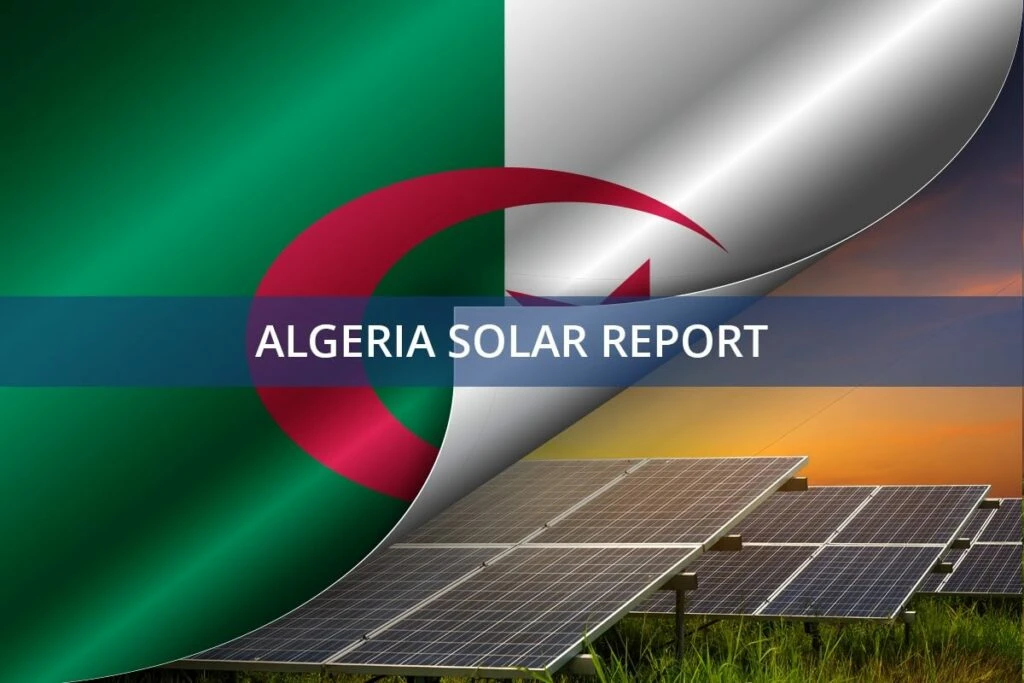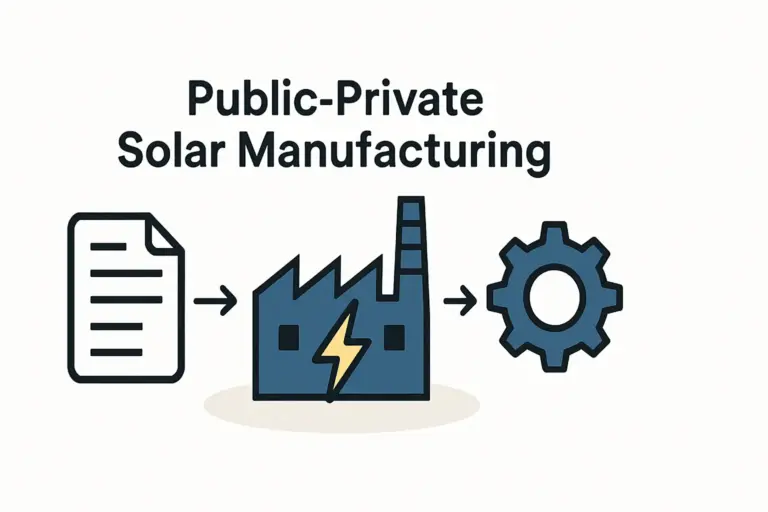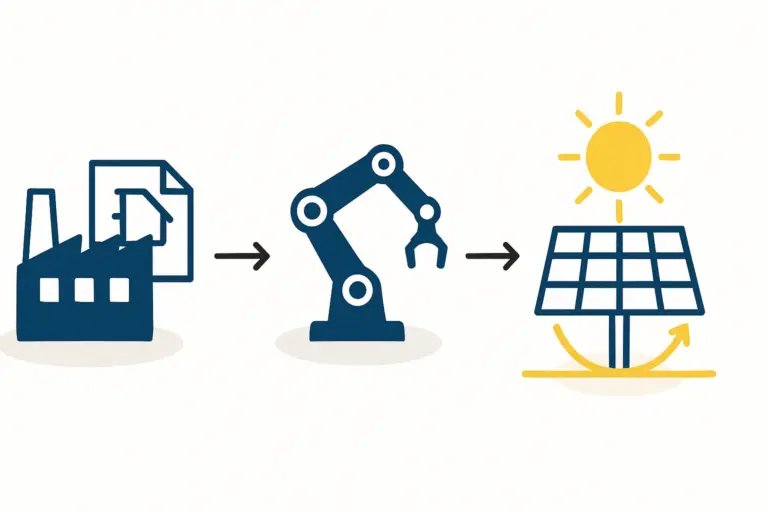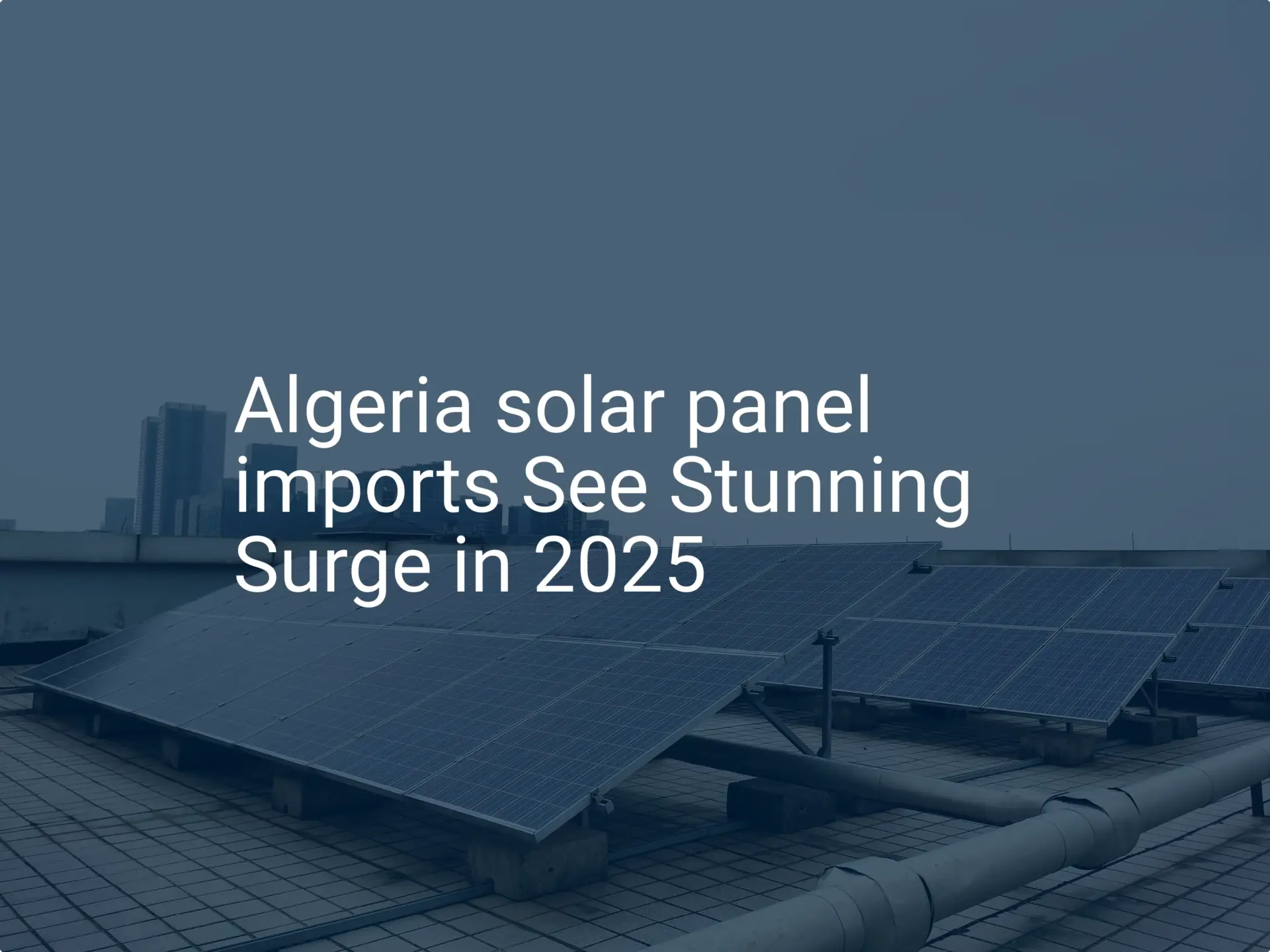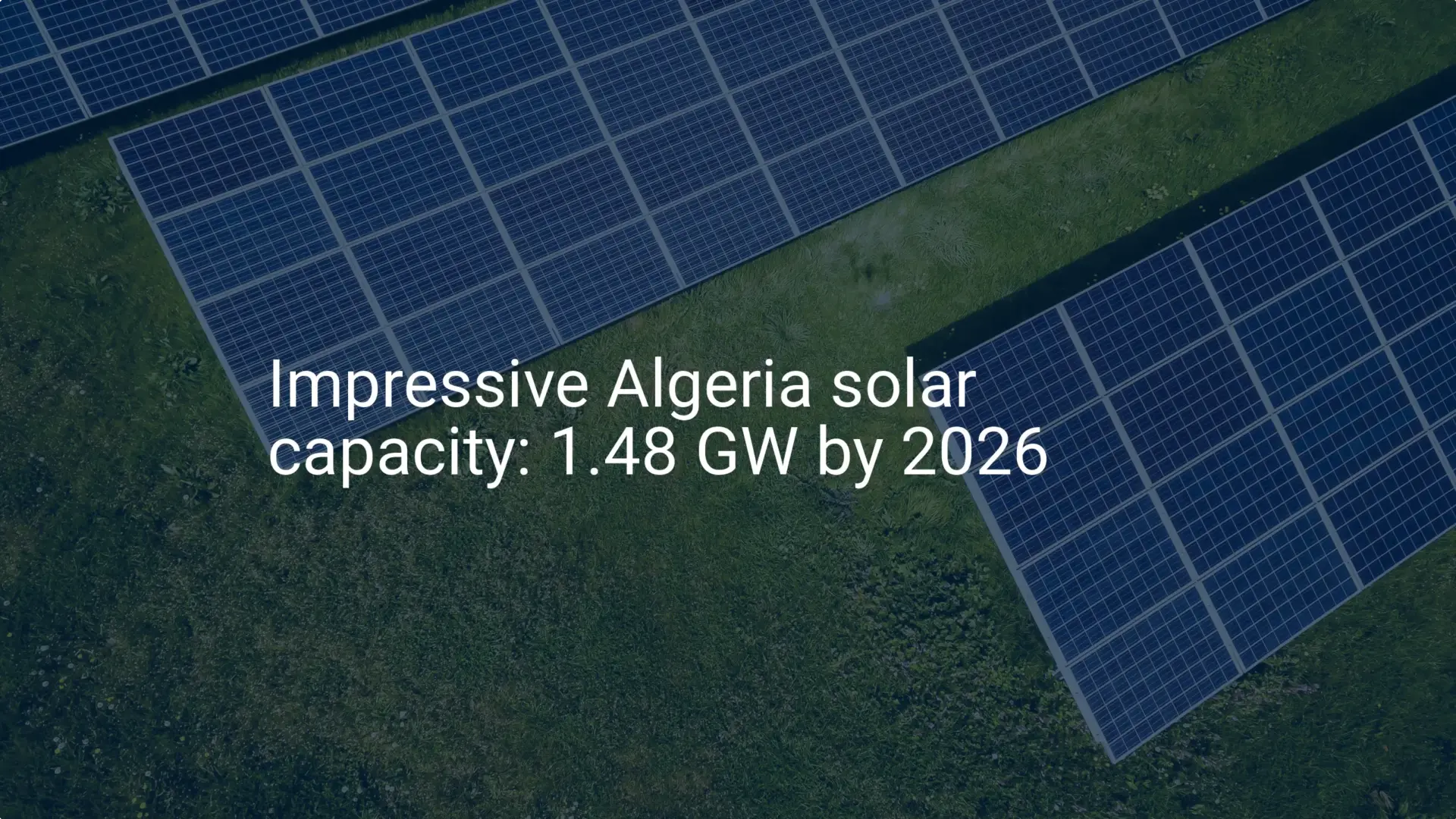Algeria is gearing up for a major solar power boom—exciting news for everyone in the industry. The country has set its sights high, aiming to generate an impressive 15,000 MW from renewable sources by 2035, with solar energy at the forefront.
This national drive is creating incredible opportunities for investors and entrepreneurs like you who are ready to establish solar panel manufacturing facilities in Algeria. It’s also important to understand that local production is no longer just an option; it’s fast becoming a cornerstone of Algeria’s strategy for energy independence and industrial growth.
Stepping into any new market, especially one with as much potential as Algeria, means navigating local regulations, permits, and compliance requirements. This process requires diligence and a clear roadmap, which is exactly what this guide provides. We’re here to walk you through the essential steps and key considerations for setting up a solar module factory in Algeria. If you want to understand the broader market potential first (always a smart move!), we recommend starting with our overview on Solar Manufacturing Opportunities in Algeria: A PVknowhow.com Report – it’s an excellent resource.
Table of Contents
Getting to Know Algeria’s Solar Manufacturing Scene
So, what’s the current situation on the ground? The Algerian government is actively encouraging and supporting a homegrown solar manufacturing sector. Current estimates suggest local solar module assembly capacity already stands at around 500 MW annually, with projections to climb to 600-700 MW. This growth is fueled by a strategic push for “local content” in renewable energy projects, a policy that ensures the economic benefits of the solar boom—such as job creation and local expertise—directly support Algeria.
You’ll want to keep a close eye on major tender programs like the “Solar 1000” initiative (which aims for 2,000 MW across 15 solar stations by 2025) and the ongoing 3 GW solar tender program (running 2024-2025). These aren’t just projects; they are significant drivers of demand, often specifically requiring locally made solar modules. This, in turn, creates a ready-made market for producers operating within the country. The deep involvement of key players like Sonelgaz (the state utility) and its subsidiary S-EnR sends a strong signal of the government’s commitment.
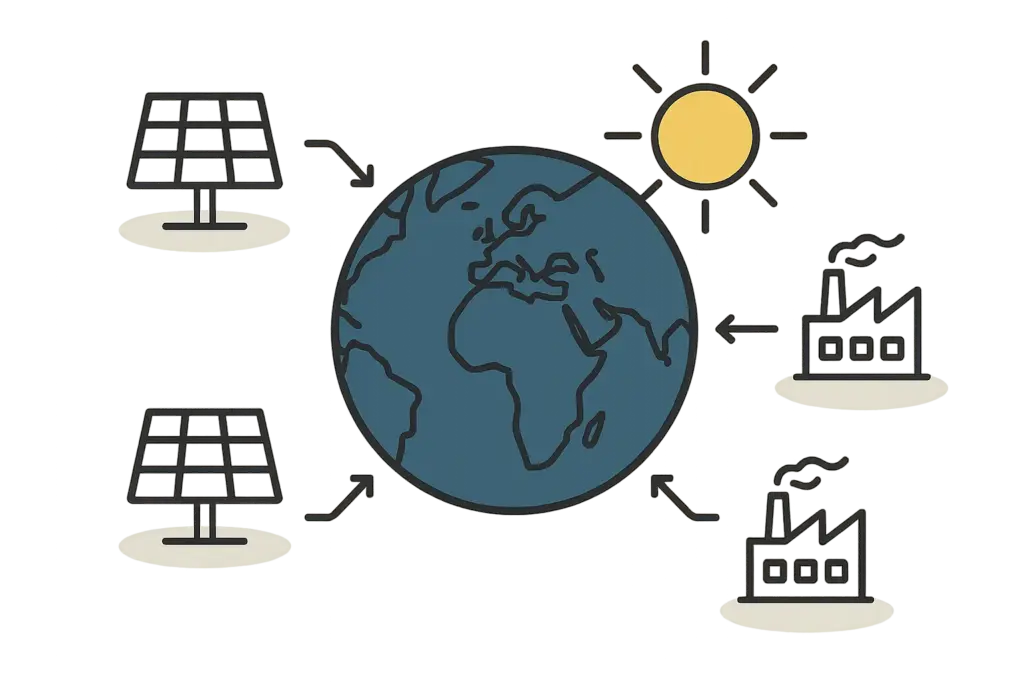
The Core Legal Stuff: Laws You Need to Know for Your Factory
Alright, let’s talk about the legal foundations. If you’re looking to set up a manufacturing operation in Algeria, you’ll need to get familiar with both the general investment laws and the specific rules for renewable energy. Let’s break it down to make it more digestible:
General Investment Laws
First, every prospective manufacturer—that’s you!—needs to navigate Algeria’s general framework for investment. Here are the key points to be aware of:
- Registering Your Company: You’ll need to officially register your business, typically with the National Trade Register Center (CNRC – Centre National du Registre de Commerce). You have options, like setting up a local Algerian company or a joint venture. Recent reforms aimed at smoothing this process and improving the business climate for foreign investors are an encouraging sign.
- Rules for Foreign Investment: Algeria has specific laws governing foreign direct investment (FDI). These outline the rights and responsibilities for international investors, covering important topics like transferring capital and handling disputes. Understanding these provisions, usually found in the Investment Law, is essential.
Laws Specific to Renewable Energy
Algeria doesn’t just rely on general laws; it has specific legislation to promote and regulate renewable energy development, which of course includes manufacturing in this sector:
- Law No. 04-09 of August 14, 2004, on the Promotion of Renewable Energies in the Framework of Sustainable Development: Think of this as the foundational law that set the stage. It was instrumental in integrating renewable energy into the national strategy and outlines key incentives and regulatory mechanisms.
- Algeria’s Renewable Energy Program (AREP): This is the comprehensive national game plan. It details the strategy, targets, and support measures for hitting the country’s renewable energy goals. Crucially for you, it often shapes policies around local manufacturing and procurement.
Gaining a solid understanding of these legal pillars is your first major step toward a successful market entry. It’s like laying the groundwork for a sturdy building.
Your Step-by-Step Permitting Journey for Solar Module Manufacturing
Taking your solar panel factory from an idea on a napkin to a fully operational facility involves several distinct permitting stages. While the fine print can change, here’s the general path you’ll likely follow. Think of it as your adventure map!
Phase 1: Getting Your Business Established & Initial Green Lights
- Company Registration: First things first, make your business official by registering with the CNRC. This is your entry ticket.
- Tax ID: Next, you’ll need a Tax Identification Number (NIF – Numéro d’Identification Fiscale) from the tax authorities.
- Statistical ID: While you’re at it, secure a Statistical Identification Number (NIS – Numéro d’Identification Statistique).
Phase 2: Industrial & Operational Licenses – The Nitty-Gritty
- Industrial License: Now for the big one. Apply to the Ministry of Industry (or the relevant regional offices) for a license to run your industrial facility. This means submitting detailed project plans, technical specs, and proof of your project’s financial backing.
- Finding Land & Zoning: You’ll need to secure suitable land for your factory. This involves double-checking zoning regulations and getting urban planning permits (Permis de Construire for any land development) to ensure your chosen spot is zoned for industrial use. Location, location, location—and making sure it’s legal!
Phase 3: Staying Green – Environmental Compliance
- Environmental Impact Assessment (EIA): For most industrial projects, a thorough EIA is a must. No cutting corners here. This study looks at the potential environmental effects of your factory and outlines how you’ll mitigate them. It must be submitted to and approved by the Ministry of Environment and Renewable Energies.
- Specific Environmental Permits: Depending on your factory’s processes (such as waste disposal, water usage, or emissions), you might need additional, specific environmental permits. It’s best to be thorough.
Phase 4: Building Your Factory
- Building Permits (Permis de Construire): Once you’ve sorted out the land and environmental approvals (phew!), you must get building permits from the local municipal authorities before any construction starts. Dot your i’s and cross your t’s!
- Getting Hooked Up (Utilities): You can’t run a factory without power. You’ll need to arrange for essential utilities like electricity, water, and gas. This often means coordinating with providers such as Sonelgaz.
Phase 5: Product Quality and Operational Go-Ahead
- Solar Module Certification: This is key. Your locally manufactured solar modules will need to comply with Algerian national standards. Often, they’ll also need internationally recognized certifications (like IEC standards) to be eligible for local projects and to guarantee quality and build trust.
- Factory Inspections & Final Operational Permits: Before you can officially kick off full-scale operations, expect inspections from various authorities (covering industry, labor, and safety). They’ll check that you’re meeting all regulations, which then leads to your final operational permits. The home stretch!
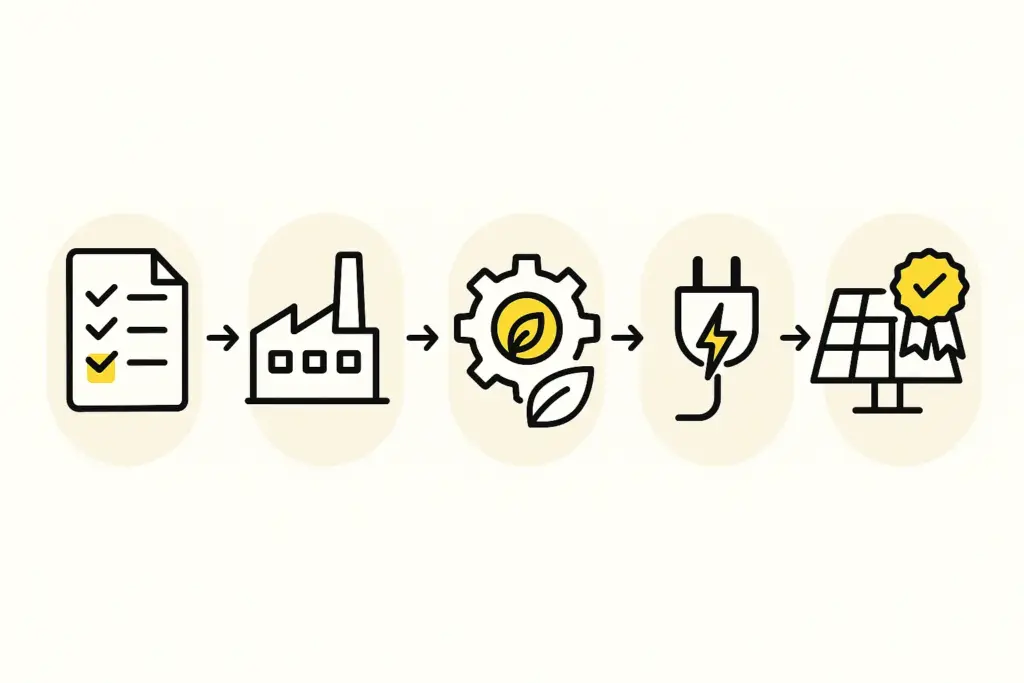
Key Compliance Must-Dos for Solar Manufacturers
So, you’ve built your factory and the machines are humming—brilliant! But it doesn’t stop there. Ongoing compliance is vital for smooth, sustained operations and long-term success.
Local Content Rules – A Big Deal in Algeria
Listen up, because this is important. The Algerian government places a strong emphasis on local content to boost its domestic industry and create jobs. As a manufacturer, you should:
- Get crystal clear on the minimum thresholds for locally sourced materials and labor. These are often spelled out in tender documents or specific incentive programs. Don’t guess!
- Develop sourcing strategies that prioritize Algerian suppliers wherever it makes sense, and be absolutely meticulous about documenting your compliance.
Technical Standards & Quality Control – Non-Negotiable
This should be a given, but it’s worth hammering home:
- You absolutely must adhere to Algerian technical standards for solar modules.
- Implementing robust internal quality control systems is essential, not just to meet these standards but also international benchmarks (think relevant IEC certifications like IEC 61215 and IEC 61730). Quality is your reputation.
Labor and Employment Laws – Taking Care of Your Team
Your people are your greatest asset.
- Make sure you comply with Algerian labor laws. This covers everything from hiring practices and working conditions to wages, worker safety (health and safety are paramount!), and social security contributions. A happy, safe workforce is a productive workforce.
The Tax Man Cometh – Understanding the Framework
No one loves taxes, but understanding them is crucial.
- Get a handle on and comply with the corporate income tax system, Value Added Tax (VAT) on your sales, and any other applicable local taxes.
- Be aware of customs duties on imported machinery, components, and raw materials. It’s also worth exploring potential exemptions or preferential regimes that might be available, as every advantage counts.
Reporting and Auditing – Keeping Things Transparent
Good housekeeping keeps everyone happy.
- You’ll need to fulfill regular financial and operational reporting obligations to the relevant government bodies, including tax authorities and possibly the Ministry of Industry.
Sweeteners: Incentives and Support for Solar Module Manufacturers
Now for some more good news. To attract investment in the renewable energy sector, including manufacturing, Algeria offers a range of incentives. It’s worth seeing what you can tap into—these can make a real difference to your bottom line.
Fiscal Incentives – Helping Your Bottom Line
- Tax Breaks: Who doesn’t like a tax break? If you’re making new investments, especially in priority areas like renewable energy manufacturing, you might benefit from temporary exemptions or reductions in corporate income tax during your first few years of operation. This can give you some valuable breathing room.
- Customs Duty Waivers: Look out for preferential treatment. This can include exemptions or reduced rates on customs duties for imported capital goods, machinery, and sometimes even raw materials needed for production. This can significantly cut your setup costs, which is always welcome.
Financial Support – Fueling Your Growth
- While direct cash grants for manufacturing might be less common, don’t overlook the power of Preferential Feed-in Tariffs (FiTs) for solar power projects. These create stable, predictable demand for locally produced modules, which indirectly gives manufacturers like you a significant advantage.
- Access to finance through local banks or specific government-backed schemes could also be an option, particularly if your project aligns closely with national strategic goals. It’s always worth asking.
Non-Financial Support – Valuable Guidance and Connections
Sometimes, it’s not just about the money.
- Government agencies like the National Agency for the Promotion of Renewable Energy and Energy Efficiency (APRUE) might offer support in terms of information, process facilitation, and even promotion. Don’t underestimate the value of a helping hand.
- Keep an eye out for initiatives supporting Research & Development (R&D) and technology transfer. These can be a real boon for manufacturers looking to innovate, improve, and build up local capabilities.
Navigating Algerian Bureaucracy: Tips for a Smoother Ride
Let’s be honest: getting through the regulatory maze in any new country requires patience, solid preparation, and good local know-how. Algeria is no different. But don’t let that daunt you.
- Local Partners and Legal Eagles: Seriously consider teaming up with reputable local legal and business consultants who have solid experience in the industrial and renewable energy sectors. They can be invaluable for handling paperwork, understanding subtle local nuances, and liaising with authorities. Think of them as your local guides, helping you navigate unfamiliar territory.
- Be Realistic About Timelines: This is a big one. Permitting processes can sometimes take longer than you might initially hope. It’s wise (and less stressful!) to factor realistic timelines and potential delays into your project planning from the get-go.
- Key Government Agencies You’ll Meet: It helps to know the key players. You’ll likely interact with:
- Ministry of Energy and Mines: Oversees energy policy and renewable energy development—central to your project.
- Ministry of Industry: Your go-to for industrial licenses and policy. You’ll get to know them.
- Ministry of Environment and Renewable Energies: Manages environmental approvals—crucial for getting your EIA signed off.
- APRUE (Agence Nationale pour la Promotion et la Rationalisation de l’Utilisation de l’Energie): Promotes renewable energy and energy efficiency—a potentially helpful resource and ally.
- SHAEMS (Shariket Kahraba wa Taket Moutadjadida) / Sonelgaz / S-EnR: These state-owned entities are heavily involved in everything from energy generation to developing renewable projects. Key players, indeed.
- CNRC (Centre National du Registre de Commerce): Where you’ll handle your company registration. Your first official step.
- And, of course, local and regional authorities for land, construction, and operational permits. They’re the ones on the ground.
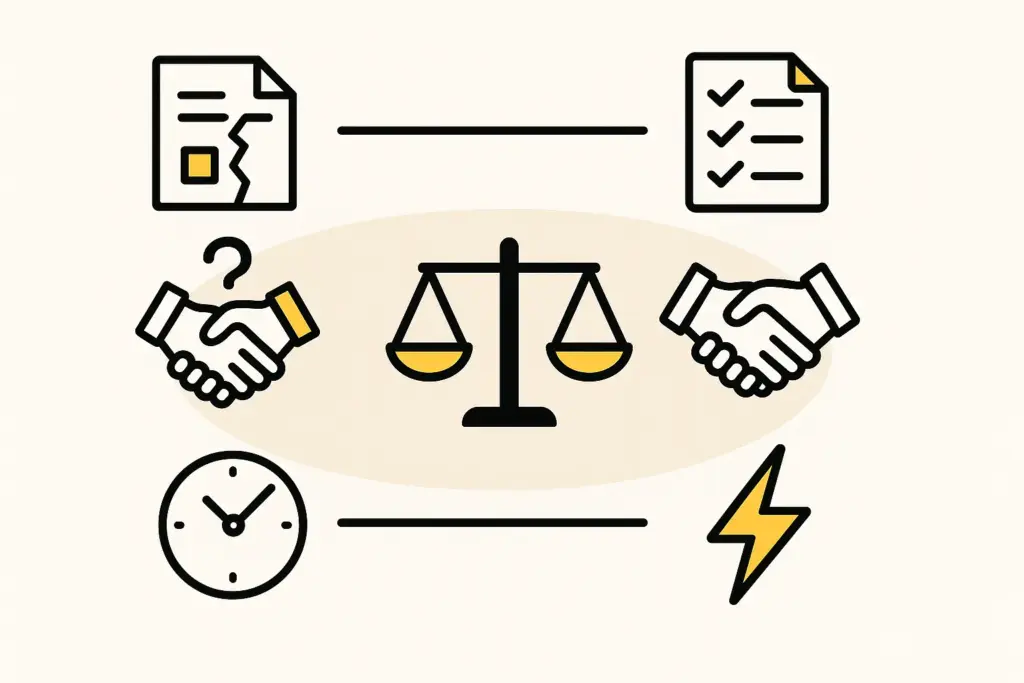
Key Steps to Get Your Solar Factory Off the Ground
Feeling a bit overwhelmed? That’s normal. Here’s a handy checklist to help keep you on track and make sure you cover the main bases:
- Market Research & Feasibility Study: (And hey, don’t forget to check our broader context piece: ‘Solar Manufacturing Opportunities in Algeria’)
- Develop a Solid Business Plan: Make sure it includes realistic financial projections and your all-important sourcing strategy.
- Line Up Your Legal and Local Experts: Find those trusted consultants – they’re worth their weight in gold!
- Company Registration (CNRC) & Get Your Initial Tax/Statistical IDs. Get those fundamentals sorted.
- Identify and Secure Suitable Land: And remember to double-check zoning compliance!
- Apply for Your Industrial License: (This will be through the Ministry of Industry).
- Conduct Your Environmental Impact Assessment (EIA): And get it approved (by the Ministry of Environment). Super important.
- Obtain All Necessary Construction Permits. No building without them!
- Plan for Your Utility Connections. Power, water, gas – the essentials.
- Develop a Plan for Module Certification and Quality Control. Quality sells.
- Understand and Plan for Local Content Requirements – they’re key! Seriously, don’t overlook this.
- Get Familiar with Labor, Tax, and Reporting Obligations. Know your responsibilities.
- Explore Available Incentives and Support Mechanisms – don’t leave benefits on the table! See what help you can get.
- Prepare for Factory Inspections and Final Operational Permits. The final hurdles.
Conclusion: Grab Your Slice of Algeria’s Solar Manufacturing Opportunity!
With Algeria so clearly and passionately committed to expanding its solar energy capacity, this is a genuinely significant and timely moment for investors interested in solar module manufacturing. Yes, there are regulatory and permitting hurdles to clear—that’s true of any ambitious venture, anywhere in the world.
But the potential rewards here are substantial: access to a growing domestic market, the immense satisfaction of contributing to national energy goals, and a pivotal role in a strategic industrial sector. It’s a chance to build something meaningful.
By understanding the legal framework, diligently following the permitting processes (patience is a virtue here!), staying on top of ongoing compliance, and making the most of the available support, entrepreneurs and companies can successfully establish and run thriving solar panel factories in Algeria.
At PVknowhow.com, we’re dedicated to helping people like you succeed in the PV industry. With over two decades of hands-on experience building and operating solar factories, it’s our specialty. If you’re seriously considering establishing a solar module production line in Algeria, we’d be delighted to explore how our deep expertise in turnkey solutions, robust business planning, and practical technical consulting can help transform your ambition into a successful, operational reality.
Want to learn more or need expert help? Visit our free e-course or explore our services. Or, if you’re ready to dive deeper, our Premium Business Plan E-Course offers personalized guidance to get your venture off the ground. Let’s make your solar journey smooth and successful.
Frequently Asked Questions (FAQs)
Q1: What are the main laws I really need to get my head around for renewable energy investment in Algeria?
A1: Good question! The big ones to get familiar with are Law No. 04-09 on the Promotion of Renewable Energies, which set the scene, and the general Investment Law, which lays out the overall framework for foreign and domestic investments. Beyond these, keep an eye out for various decrees and executive orders, as they often provide more detailed implementation guidelines. It’s always good to dig a little deeper.
Q2: Just how important are these local content requirements for solar manufacturers in Algeria? Are they a deal-breaker?
A2: They’re incredibly important—think of them as a top priority for the Algerian government. The main goal is to stimulate local industry and create much-needed jobs. So yes, meeting these requirements is often crucial if you want to participate in government tenders and access certain valuable incentives. Definitely factor this into your planning from day one.
Q3: Which government bodies are the most critical when it comes to getting permits for a solar factory? Who will I be talking to most?
A3: You’ll be interacting with a few key players on your journey. The National Trade Register Center (CNRC) is essential for your initial company registration. The Ministry of Industry is your main contact for industrial licenses. The Ministry of Environment is your go-to for the all-important EIAs. And then, don’t forget the local/municipal authorities; they’ll be involved in land use and construction permits. It’s also good to remember that Sonelgaz (the state utility) and APRUE (the renewable energy promotion agency) play significant roles in the wider renewable energy ecosystem.
Q4: Are there specific technical standards for solar panels sold in Algeria that I need to worry about?
A4: Yes, absolutely—and it’s good you’re asking. Solar panels manufactured or sold in Algeria must comply with Algerian national standards. The good news is that these are often aligned with well-recognized international standards, like those from the International Electrotechnical Commission (IEC). As a manufacturer, you’ll need to ensure your products meet these specifications and get the necessary certifications. It’s all about quality and safety.
Q5: What kind of incentives can a solar module manufacturer realistically expect in Algeria? Is there good support available?
A5: There are several types of support you might be able to tap into, which is great news. You could find tax holidays or reductions for an initial period (which can really help cash flow), and potentially customs duty exemptions on imported machinery and equipment. Agencies promoting investment might also offer support. Also, and this is a big one, the strong demand created by government solar tenders acts as a powerful indirect incentive, creating a market for your locally produced products. So, it’s a mix of direct and indirect benefits.

